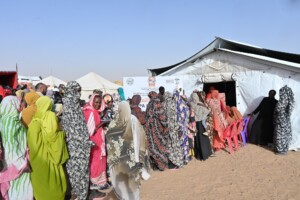Khartoum markets, business closed; Sudan junta acknowledges internet black-out
Most shops in the markets and residential areas in the capital Khartoum have been closed for the second day in a row as the Sudanese public answers the call to carry out a campaign of comprehensive civil disobedience.
 Shops and businesses have been closed (RD)
Shops and businesses have been closed (RD)
Most shops in the markets and residential areas in the capital Khartoum have been closed for the second day in a row as the Sudanese public answers the call to carry out a campaign of comprehensive civil disobedience.
The exception is some public transport that is still running and a small number of private cars carrying passengers.
The majority of companies and business offices were also closed in the capital Khartoum for the second day of civil disobedience, while shops, petrol stations and some units in commercial banks returned to work after they were closed on Sunday.
Witnesses said Khartoum airport had only very few flights and that stranded passengers overcrowded the terminal.
Internet shut-down
They added that most travel offices were closed because of the ongoing interruption of the Internet.
The spokesman for the ruling Transitional Military Council (TMC), Shamseldin Kabbashi, acknowledged that the TMC has cut off the internet from Sudan without giving reasons.
He also acknowledged “mistakes in implementation” during the security operation that violently dispersed the sit-in in front of the General Command in Khartoum, which left more than 100 protestors dead, and hundreds more injured.
Civil disobedience
While the Alliance for Freedom and Change (AFC) asserts that the response to the campaign has been significant, the TMC has downplayed the scale of civil disobedience, claiming that government institutions have been “well-functioning and unaffected”.
The head of the Security Committee of the TMC, Jamal Omar, said in a statement that citizens have not responded to the calls for disobedience and insisted on access to their work sites despite the roadblocks and other barriers.
He said in a statement that “the method of closing roads and building barricades practiced by the AFC is contrary to law, customs and religion and goes beyond the limits of the practice of political action and represents full elements of crime”.
He said the military junta has decided to strengthen the security presence of the armed forces, the paramilitary Rapid Support Forces (RSF), and other regular forces to restore normalcy and open roads, adding that these forces would continue to patrol throughout the day.
Sudanese Professionals Association: ‘Avoid confrontation with RSF’
The Sudanese Professionals Association (SPA), the driving force behind the uprising, announced the continuation of the comprehensive civil disobedience action until the handover of power to a civilian government, stressing that there is no reconciliation, no concession or truce and no handshake with those whom it described as criminals.
The people will continue to set barricades in all the main streets, sub-bridges and bridges without guarding them, but with the insistence to return them again if the so called “Janjaweed and the militias of the military coup” remove them.
The association stressed the need to avoid any confrontation with the RSF and security forces and maintain the peaceful nature of the protests in general and civil the disobedience in particular.
Our editorial independence means that we can continue to provide factual updates about ongoing protests to Sudanese and international actors, educate people about how to avoid outbreaks of infectious diseases, and provide a window to the world for those in all corners of Sudan. Support Radio Dabanga for as little as €2.50, the equivalent of a cup of coffee.












 and then
and then